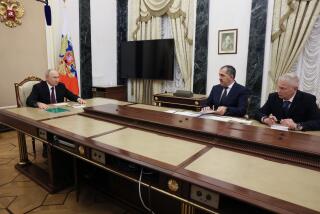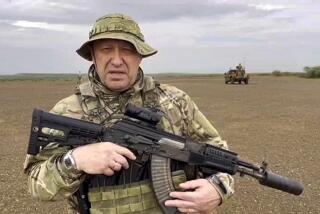Reviled KGB Will Still Be in Cloak-and-Dagger Business : Espionage: Bakatin, its new chief, says he has no plans to cut into its intelligence operations.
- Share via
MOSCOW — Chief KGB spy catcher Gennady Titov, thrice expelled from foreign countries for espionage in 40 years as a Soviet agent, jerked his head contemptuously when asked if he was worried that the KGB’s counterintelligence section was about to be purged.
“I’m not afraid,” Titov, gray-haired and round-faced, blustered.
The KGB, now openly referred to by many Soviet citizens as a national “monster,” is being abruptly dismembered, its troops, technology and officials dispersed to other branches of government. But even the officials charged to reform it say it will remain big in the cloak-and-dagger business.
Even after being stripped of about 230,000 border troops, which were transferred to the Defense Ministry, the security agency still has an estimated 400,000 employees, members of a new government panel investigating the KGB said. Its budget this year is more than $5 billion rubles--almost $3 billion at the commercial exchange rate.
Vadim V. Bakatin, who was confirmed by the Supreme Soviet on Thursday as the new head of the KGB, told Russian Television that he plans to cut the agency down to only three arms: intelligence, counterintelligence and “dangerous state crimes”--but that he has no plans to slice into what is considered the meat of the agency, its intelligence functions.
If he did, he could run up against opposition even from President Mikhail S. Gorbachev, whose anger against the KGB for betraying him by largely supporting last week’s attempted putsch appears to be running its course.
Speaking to the Supreme Soviet during a discussion of KGB reform, Gorbachev noted that “in the United States, when someone begins to speak about intelligence, the answer is just ‘No comment.’ ”
Titov, in one of his first public appearances since Gorbachev appointed him to head counterintelligence this January, told reporters that “something new has to be proposed before anything is destroyed. I think we’ve become convinced of that.”
“Our main task,” he said, speaking after the first meeting of the government panel appointed to investigate the KGB’s role in last week’s attempted coup, “is to do everything to ensure full-blooded, quite strong intelligence, as there is in other countries.”
Victor Ivanenko, chief of the Russian Federation’s KGB, cautioned that there should be no rush to ram through reforms that could ultimately hurt the agency’s intelligence capabilities.
And Bakatin, although clearly committed to serious reform, has refused point-blank to release the files on KGB agents.
“I would sooner resign,” he told the Supreme Soviet.
Bakatin promised lawmakers that, “as for the withdrawal of the so-called officers of acting reserve from organizations which do not want them, that will be done at once.”
But panel members could give no clear promise that the agents who penetrate virtually every Soviet organization would be jobless tomorrow.
Titov even refused to criticize students who keep tabs on their fellows, saying: “What is a stool pigeon? To denounce someone is to say something nasty or to slander them.”
“Spying has become much harder than it used to be,” he added nostalgically. “I wouldn’t want to be an informer, but if I were appealed to, I would help Soviet spying.”
Titov’s answers left Soviet journalists openly dissatisfied, and even prompted a reporter from the Moscow tabloid Kuranty to comment that his “spy mania” left Titov unable to understand where the questions were leading him.
“All these questions are about what has changed to prevent you from working against us, eavesdropping on us and peeking at us,” the reporter said.
Commission member Nikolai Ryabov stepped in, assuring her that legal guarantees would be created to protect the Soviet people from the paranoia of the past while allowing spies to continue legitimate work.
“People are tired of carrying such a monster on our budget and on our backs,” he said.
Since the attempted coup, decades of pent-up hatred of the KGB--the Russian acronym for State Security Committee--have come to the surface, culminating in the angry crowd that brought down the 14-ton statue of founder Felix Dzerzhinsky last week.
Former KGB chief Vladimir A. Kryuchkov is currently charged with treason, along with several of his lieutenants, and Gorbachev has fired the top leadership--all except Titov, who was on vacation during the coup--and put the equivalent of the Secret Service under the control of the president’s office. Agents in government communications and military intelligence have also been transferred.
Ivanenko assured reporters that the agency’s very concepts have changed. Before, he said, “we saw the main threat in the ideological structure,” but now, “we’ll evaluate things on the basis of national security.”
But after so many years of living with eavesdropping, mail-interception and political persecution, the Soviet people are slow to believe.
Even Sergei Alexeyev, the normally restrained head of the state Committee on Constitutional Compliance, called at the Supreme Soviet earlier this week for the KGB to be totally dissolved except for counterintelligence and the presidential guard.
In an interview Thursday, Alexeyev said that he was convinced that even his own phone had been bugged, and he had called the KGB at one point to complain.
“A secret police is just not compatible with a democratic society,” he said. “This monster just has to be gotten rid of.”
Alexeyev fears, he said, that democratic leaders will find their own uses for the KGB and keep it largely intact, or that they will be fooled into thinking it has been de-clawed.
“The KGB won’t go into open opposition to reform,” he said. “The danger is that it will start to adapt, keeping its current mood.”
Ultimately, deep reform of the KGB may be determined by finances.
Whatever the country’s security needs, it appears that it can no longer support a massive structure for political spying. Even after transferring the communications technology workers who take up about one-quarter of the KGB budget to a new state committee, “the KGB has no means to cover the third (financial) quarter” this year, Bakatin said.
“The financial situation is catastrophic,” he said.
More to Read
Sign up for Essential California
The most important California stories and recommendations in your inbox every morning.
You may occasionally receive promotional content from the Los Angeles Times.













